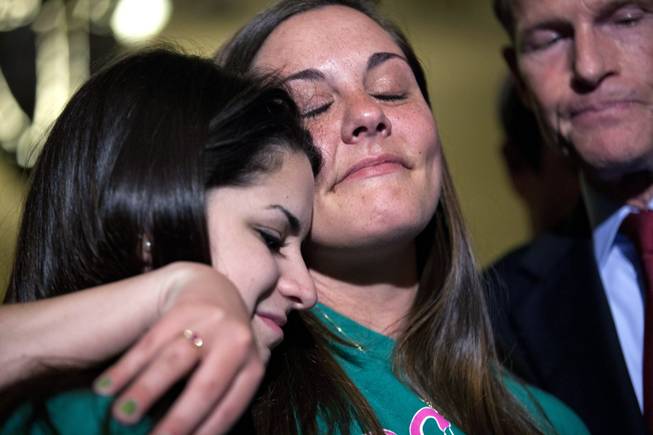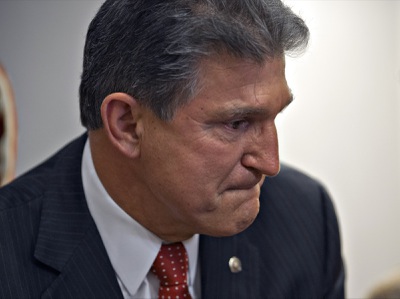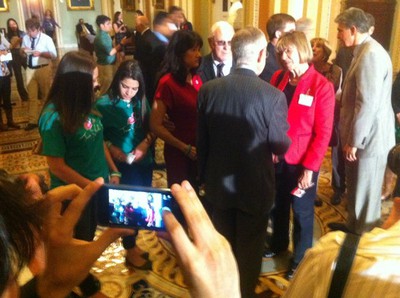
ASSOCIATED PRESS
Carlee Soto, sister of Sandy Hook teacher Victoria Soto, left, and Erica Laffferty, daughter of Sandy Hook principal Dawn Hochsprung, embrace outside the Senate chamber after a vote on gun legislation on Capitol Hill, April 17, 2013, in Washington. Senate Republicans backed by a small band of rural-state Democrats scuttled the most far reaching gun control legislation in two decades, rejecting calls to tighten background checks on firearms buyers.
Thursday, April 18, 2013 | 2 a.m.
Sun coverage
Wednesday’s Senate vote on a background check compromise had all the setup of a historic moment.
The Senate floor was good and crowded, as all 100 senators milled and bunched in like-minded groups of three or four and sometimes 10, keeping a close eye on the front desk, where Vice President Joe Biden had made one of his rare trips down to the Capitol to preside over the vote.
Above them, survivors and families of shooting victims in Tuscon, Aurora, Newtown and other American towns whose names are now shorthand for unfathomable tragedy were also tightly packed in, watching the strange and haphazard dance of senators casting a critical vote.
At the front of the room, Sen. Harry Reid broke his usual habit of pacing near his podium during votes, taking up a spot behind two vote-talliers instead. For most of the vote, he leaned over them, a hand on the back of each of their chairs as he alternated his concerted, lingering stare between one counter’s paper tally sheet, the other counter’s laptop screen, and the faces of senators who approached to cast their votes.
The arrival of Sen. Frank Lautenberg, the ailing 89-year-old New Jersey Democrat who has been too sick to work the past several weeks, momentarily broke the tension. Democrats had called him back to cast what they hoped would be the 60th, filibuster-denying vote for the amendment to expand background checks, a key component of the gun control he’d fought long and hard for during his Senate career. When he arrived — pale, frail and apparently too weak to rise from his wheelchair — Virginia Sen. Joe Manchin, the amendment’s Democratic co-author, kissed him on the cheek.
But from the very start, the scene belied one unshakeable fact: That supporters of gun control, as framed in the Manchin-Toomey amendment to expand background checks, never had the votes to get it through the Senate.
It became clear that the gun control advocates in Congress were fighting a losing battle only in the past 24 hours, as a march of senators — including Nevada’s Dean Heller — declared that despite their stated support for enhancing background checks, they would not be voting for the Manchin-Toomey amendment. Heller cited concerns that the legislation might allow for the creation of a national gun registry. Even a few Democrats, whose support was crucial to give the legislation a fighting chance, began to openly defect from the party’s position.
Backers, however, would not give in to the numbers, and spent Wednesday waging an impassioned, almost desperate campaign to change minds.
Manchin brought oversized pictures of turban-clad Adam Gadhan, an American al-Qaida operative, to the floor, pleading with his colleagues to help close the loopholes that let criminals procure firearms from gun shows and online.
Reid, meanwhile, effectively ripped up his healthy NRA rating on the Senate floor Wednesday morning, declaring that not only would he vote for Manchin-Toomey, but a ban on assault rifles and high-capacity magazines as well.
“Today I choose to vote my conscience,” Reid said, challenging his colleagues to come up with one defensible reason not to join him.
Only when the votes were in did Reid appear to finally admit defeat, returning to his podium and giving a subtle, silent nod to Biden — the vice president’s cue to close the vote, at 54 to 46 — not enough to pass a filibuster threat.
Yet as it turned out, no one was in the mood for somber acceptance of political reality.
“Shame on you!” a woman cried from the balcony where the victims and survivors of shooting were sitting.
Under normal circumstances, an outburst like this would set Capitol Police running. But the shouter, Patricia Maisch of Tucson, Ariz., was the woman who had knocked a magazine clip out of the hand of Jared Lee Loughner, the gunman who shot former Rep. Gabby Giffords and several others during a constituent event two years ago. Nobody messed with her, and she calmly exited the Senate with the rest of the varied shooting victims and survivors.
At the other end of Pennsylvania Avenue, President Barack Obama was shouting uncharacteristically angry-sounding words, too.
“All in all, this was a pretty shameful day for Washington,” he said in an unprecedentedly icy tone. “The gun lobby and its allies willfully lied about the bill … and unfortunately, this pattern of spreading untruths about this legislation served a purpose, because those lies upset an intense minority of gun owners and that, in turn, intimidated a lot of senators.”
But the president’s sharp words, it turned out, were not just for his political foes, who in recent weeks, in his estimation, had put more skin into the game lobbying members of Congress and convincing undecided lawmakers that the Manchin-Toomey amendment came too close to enabling a national gun registry — even though such registries were explicitly blocked in the bill.
Obama was also speaking to his own people.
“Those who care deeply about preventing more gun violence will have to be as passionate and as organized and as vocal as those who blocked these common-sense steps to help keep our kids safe,” Obama said, referring to the strength of the shooting victims' families, gathered around him at the White House. “To change Washington, you, the American people are going to have to sustain some passion about this. When necessary, you’ve got to send the right people to Washington. And that requires strength, and it requires persistence.
“I see this as just Round One,” he added.
Back at the Capitol, Democratic lawmakers, also flanked by shooting victims’ families, were also trying to turn the defeat into a call for action.
“We knew all along that this wouldn’t be easy,” Reid said. “This is just the beginning. This is not the end.”
“Things change quickly here in Washington,” Sen. Chuck Schumer said. “They changed for gay marriage, they’re changing for immigration reform and they will change for gun safety sooner than you think.”
But the nagging question remains: When?
Manchin-Toomey wasn’t the only piece of gun control legislation that failed in the Senate on Wednesday. So did every other gun control amendment — until eventually, Reid decided to stop the legislative slide and table the remaining two of nine total gun control amendments until Thursday. Reports circulating late Wednesday suggested Reid might even pull the bill entirely before it could get finally shot down.

Sen. Joe Manchin, D-W.Va., becomes emotional as he meets in his office with families of victims of the Sandy Hook Elementary School shooting in Newtown, Conn., on the day he announced that they have reached a bipartisan deal on expanding background checks to more gun buyers, at the Capitol in Washington, Wednesday, April 10, 2013.
In the meantime, while conservative senators spent this week proposing watered-down alternatives to the gun control amendments, leading architects of a background check expansion don’t appear to have a plan for how to proceed.
“I would like to find out, the people who voted for cloture, how they became uncomfortable with the bill,” Manchin said after the vote. Twelve Republican and two Democratic senators, including Heller, who had voted to proceed with the gun control debate last week, refused to support the amendment Wednesday.
Manchin said he fully intended to have a conversation with every one of those senators, to see where he lost them.
“Everybody’s worth going after. Everybody’s worth sitting down and talking with … I don’t give up,” Manchin, who is friends with Heller, added. But when asked what changes to the bill he might make after those conversations, he said: “I can’t knowingly and openly create any loopholes or concessions.”
So Congress will slog along with the status quo, until they find some better way of meeting in the middle — an area that theoretically should lie in the realm of background checks, where senators from either side of Wednesday’s vote say they are still committed to strengthening the system.
“I believe very strongly that our current background check system needs strengthening and improving, particularly in areas that could keep guns out of the hands of felons and the mentally ill,” Heller said Tuesday, upon announcing that he would not vote for the Manchin-Toomey amendment.
“Requiring a simple background check every time a gun is sold is common sense,” Reid said this month, when saying he would bring up a background check proposal.
“I’m assuming that the emotions that we’ve all felt since Newtown, the emotions that we’ve all felt since Tucson and Aurora and Chicago — the pain we share with these families and families all across the country who’ve lost a loved one to gun violence — I’m assuming that's not a temporary thing,” Obama said to both of them Wednesday, along with the rest of the country. “I’m assuming our expressions of grief and our commitment to do something different to prevent these things from happening are not empty words. I believe we’re going to be able to get this done. Sooner or later, we are going to get this right.”



Join the Discussion:
Check this out for a full explanation of our conversion to the LiveFyre commenting system and instructions on how to sign up for an account.
Full comments policy